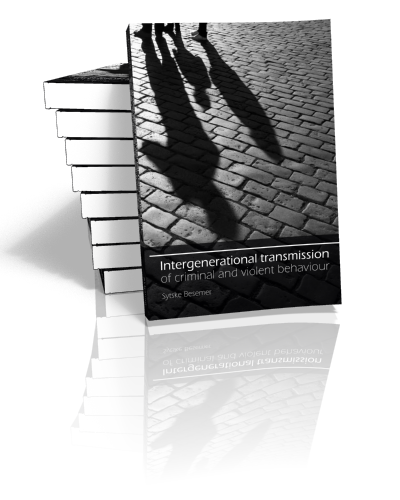Abstract:
‘The apple doesn’t fall far from the tree’, ‘Like father like son’, ‘Chip off the old block’. All these idioms seem to suggest that offspring resemble their parents and this also applies to criminal behaviour. This dissertation investigates mechanisms that might explain why children with criminal parents have a higher risk of committing crime. Several explanations for this intergenerational transmission have been contrasted, such as social learning (imitation of behaviour), official bias against certain families, and transmission of risk factors. Sytske Besemer investigated this in England as well as in the Netherlands.
She answers questions such as: does it matter when the parents committed crime in the child’s life? Do more persistent offenders transmit crime more than sporadic offenders? Do violent offenders specifically transmit violent behaviour or general crime to their children? Might the police and courts be biased against certain families? Could a deprived environment explain why parents as well as children show criminal behaviour? Does parental imprisonment pose an extra risk?
This dissertation is the first study to specifically investigate these mechanisms of intergenerational continuity. The study is scientifically relevant because of its breadth, integration of conviction data as well as data on self-reported offending and environmental risk factors, its comparative design and the long periods over which transmission is investigated. Furthermore, the dissertation has important policy implications. It demonstrates how penal policy designed to reduce criminal behaviour might actually increase this behaviour in the next generation. This is especially important since Western countries such as the United Kingdom and the Netherlands show an increasing trend towards more punitive policies.


Dr.
Sytske Besemer
Sytske Besemer studied psychology and criminology at Leiden University and at the VU University Amsterdam before embarking on a PhD at the Institute of Criminology at the University of Cambridge, UK. She now works as criminal justice researcher in the Trust and Safety Team at Uber Technologies in San Francisco.
read more









